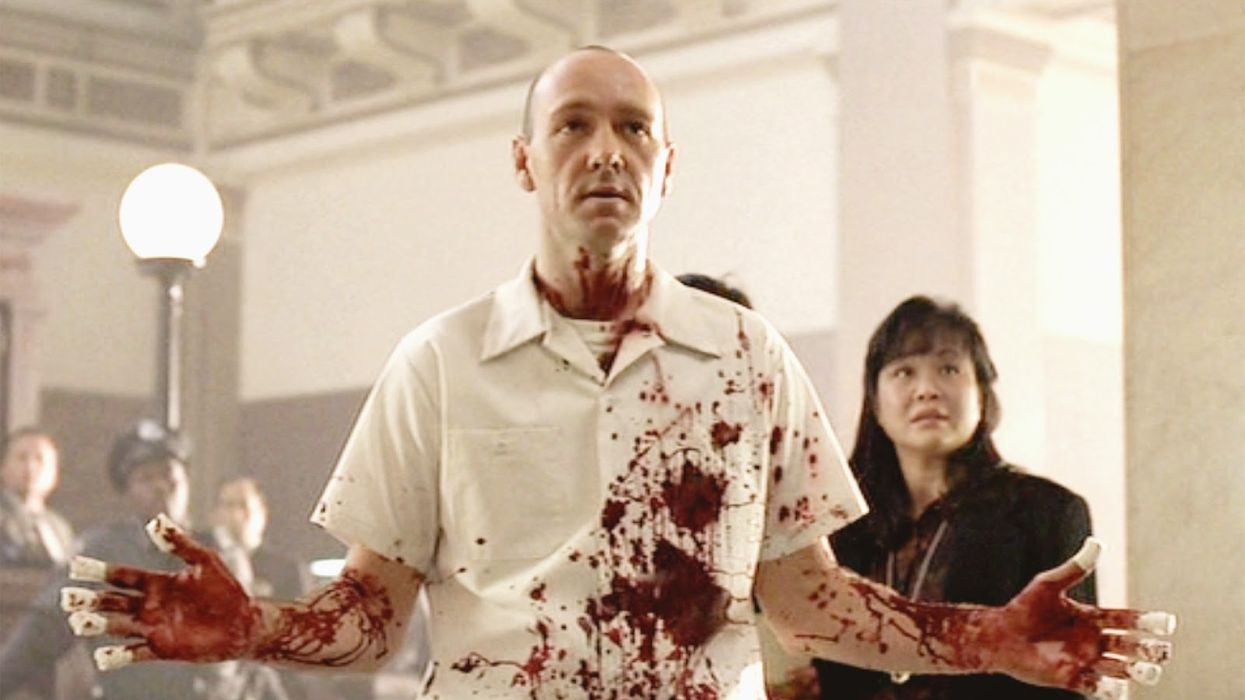Watch: How 'Se7en' and 'True Detective' Find Light in the Darkest Places
There is a surprising optimism at the center of the despairing worlds of 'Se7en' and 'True Detective'.

Both 1995's Se7en and HBO series True Detective take place amidst the darker reaches of the human soul and feature those who dwell there—both the perpetrators and the ones who attempt to find justice. In the new video essay below, Michael Tucker of Lessons from the Screenplay argues that, not only does the first season of True Detective share many themes with the famous David Fincher thriller, but that these themes are "ultimately optimistic in nature."
The world is worth fighting for
Quoting from the book Creating Character Arcs, the point is made that, to a degree, "character=theme" in any story. Not only that, but characters and the journeys they take, "influence story structure." If this seems facile, well, perhaps it is, but then again, there are hundreds of screenwriting seminars and books devoted to principles like these, which are essentially modern explications and commentary on Aristotle's observations. Despite that fact, so many works of art neglect these principles that the ones that do stand out, soaring above the rest.
For Tucker, the themes of both works are expressed best by the epigraph to the Se7en screenplay, a quote from Ernest Hemingway: "The world is a fine place, and worth fighting for." This, of course, became the ending line of the film, with the addendum of Detective Somerset's commentary, in voiceover: "I believe the second part." Ironically, David Fincher was dead set against this ending, but he was overruled by a skittish studio, and the theme of the film coalesced around this concept, for better or worse. Tucker argues better; rather than sinking further into the mire, the coda provides what Tucker considers the film's basic theme: "The world is not a fine place. It is filled with pain and terrible people. But there is also good, and at the end of the day it's worth fighting for." However, it's worth noting that this is only Somerset's view at the end of an arc that has taken him from apathy to action.
We find ways to cope, even if those ways are lies
In True Detective, Somerset's analogue is Rustin Cohle, who expresses his pessimistic (really, only a few degrees canted from nihilist) world view that perhaps the best thing the human race could do is to embrace its fate and "walk...into extinction." Both Somerset and Cohle begin their journeys at the 3 am of their long dark nights, but why? Well, both are haunted by "wounds," or past traumas that are "often kept secret from others because embedded within them is the lie—an untruth that the character believes about himself." The secrets we keep from others, then, are the ones we keep from ourselves.
The haunted character attempts to solve the real mystery: Why do we behave as we do?
In both stories, these wounds, or "ghosts," as Freeman's character calls them, involve children. Cohle lost a child in a car accident, and Freeman convinced an ex-girlfriend to abort a pregnancy rather than bring life into a world of irremediable wickedness. Freeman is convinced that he "made the right choice," but also never goes a day without wishing he made a different one. Cohle also views the death of his child as fortunate, in a way, because the accident "spared her" from the same sort of world inhabited by Somerset.
The crucial point being made here is that in order to behave as if your child "was spared the burden of existence, one has to believe that existence is a burden." Humans may be called Homo Sapiens but perhaps a better appellation would be Homo Medax, the "lying man" (and yes, Latin is a super gendered language and definitely not very progressive or woke, but you know, remember Gladiator?) In each case, the protagonists have invented reasons to cope, even though those reasons may be lies that they tell themselves. Thus, they go on living despite their own losses.
Partners can provide a counterpoint
Tucker's essay further develops the idea of the partner character (Pitt and, in the iteration of True Detective under discussion, Woody Harrelson's Hart) and their role as catalysts. They are opposing arguments in shoes, there to debate the world-view of the protagonist and, furthermore, help the haunted character solve the real mystery: Why do we behave as we do? What are we hiding from ourselves? Perhaps this is why Aristotle considered Oedipus Rex the apotheosis of drama: the revelations without are those that lead to the revelations within.
The argument is that questioning the plausibility of events (Wouldn't Oedipus, at some point, have become aware of this stuff?) misses the point. Sophocles, in his play, is dramatizing the lies we tell ourselves, and the collusion of those around us in how they aid and comfort our self-deception. The real mystery is the one within ourselves, and the twist is that, no matter how much time passes, and how civilizations change, the core of our being is fundamentally the same; we are all liars who deceive even ourselves. But in order to go on living in a world that, let's face it, is very much a bummer sometimes, we kind of have to. Good storytelling involves a recognition of this, and in it there is some fundamental optimism.
So, to sum up, we're all strangers to ourselves, and the world, crazy as it is, is worth fighting for.
Source: Lessons from the Screenplay











